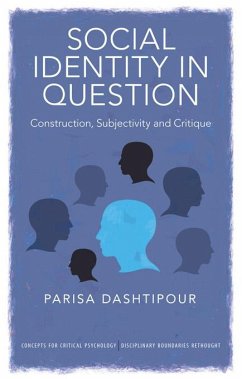Social Identity in Question begins by reviewing the ways in which the social identity tradition has previously been critiqued by social psychologists who view human relations as conditioned by historical context, culture and language. The author offers an alternative perspective, based upon psychoanalytic notions of subjectivity. The chapters go on to develop these discussions, and they cover topics such as:
- self-categorisation theory
- group attachment and conformity
- the minimal group paradigm
- intergroup conflict, social change and resistance
Each chapter seeks to disrupt the image of the subject as rational and unitary, and to question whether human relations are predictable. It is a book which will be of great interest to lecturers, researchers, and students in critical psychology, social psychology, social sciences and cultural studies.
Dieser Download kann aus rechtlichen Gründen nur mit Rechnungsadresse in A, B, BG, CY, CZ, D, DK, EW, E, FIN, F, GR, HR, H, IRL, I, LT, L, LR, M, NL, PL, P, R, S, SLO, SK ausgeliefert werden.









